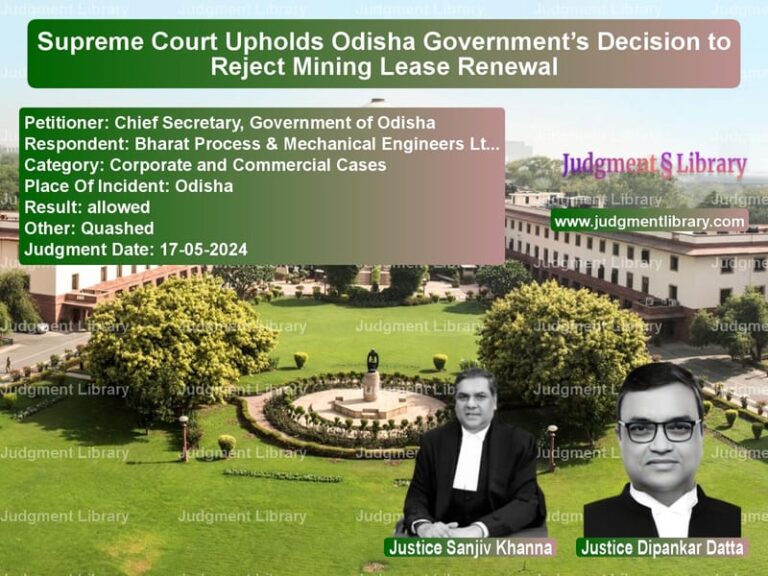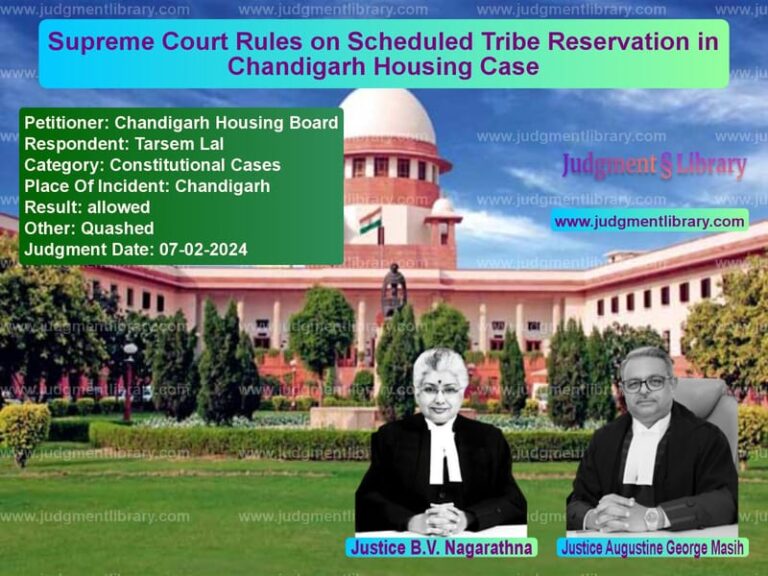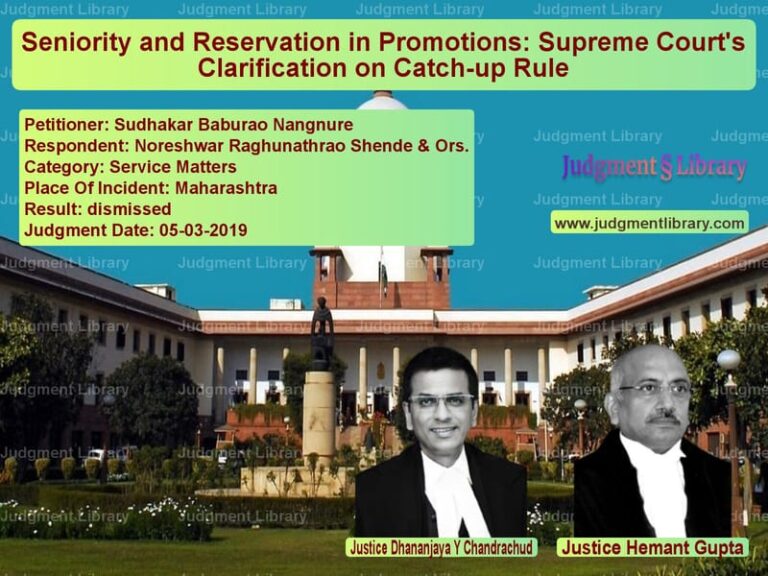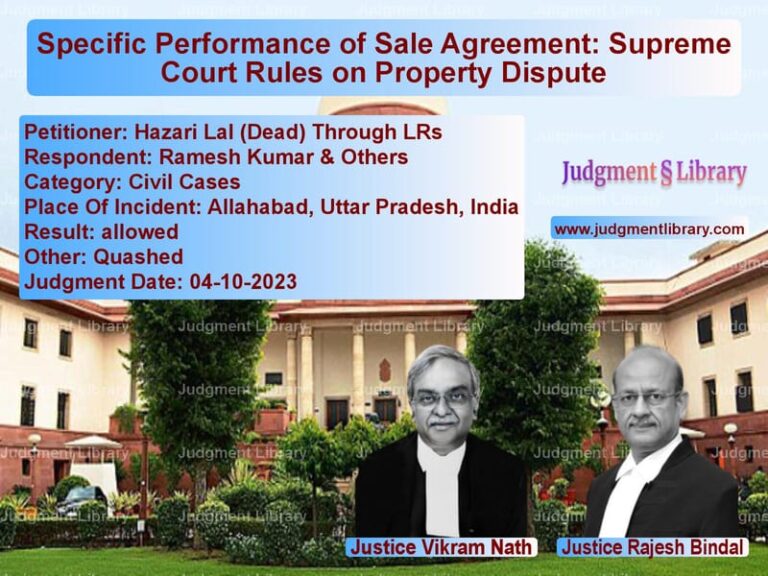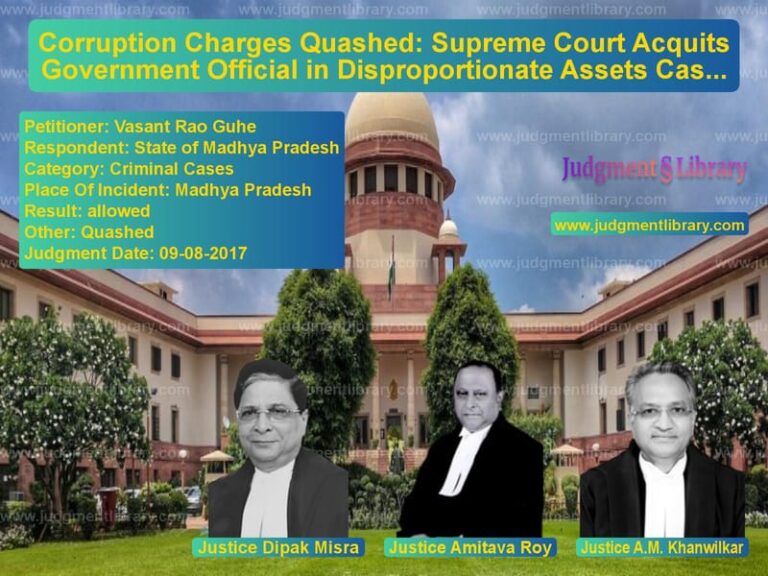Liquor Ban on Highways: Supreme Court Clarifies the Scope of Its Ruling
In a significant judgment, the Supreme Court of India addressed the applicability of its liquor ban directive on highways within municipal limits. The case arose from a challenge to a notification by the Chandigarh Administration, which reclassified certain city roads to avoid the impact of the liquor ban. The Court provided clarity on the purpose and scope of its previous ruling in State of Tamil Nadu vs. K. Balu, ensuring that the objective of reducing drunken driving risks on highways is upheld while acknowledging the functional differences between highways and city roads.
Background of the Case
The case was brought by Arrive Safe Society of Chandigarh, a public interest organization advocating for road safety. The petitioner challenged the Chandigarh Administration’s notification dated March 16, 2017, which reclassified major arterial roads (V1, V2, and V3 roads) as major district roads, except for National Highway 21 and Madhya Marg. The petitioner argued that this reclassification was an attempt to bypass the Supreme Court’s ruling in the K. Balu case, which prohibited the sale of liquor along highways.
Previously, on October 21, 2005, the Chandigarh Administration had issued a notification designating several arterial roads as state highways. This was done to access funds from the Central Road Fund for maintenance and development. However, the March 2017 notification changed the classification, effectively exempting these roads from the liquor ban imposed by the Supreme Court.
Arguments of the Petitioner
The petitioner argued that the reclassification was a deliberate attempt to circumvent the Supreme Court’s ruling. The petitioner contended that the judgment in K. Balu sought to reduce highway accidents caused by drunken driving. Allowing liquor shops to operate on these reclassified roads would defeat the very purpose of the Court’s directive.
Additionally, the petitioner submitted that:
- The reclassification was arbitrary and aimed solely at avoiding compliance with the liquor ban.
- The roads in question were functionally highways, providing connectivity between key city sectors.
- The Supreme Court’s ruling applied to all highways, regardless of subsequent reclassification by local authorities.
Arguments of the Respondent
The Chandigarh Administration, represented by the Additional Solicitor General, defended the reclassification, arguing that:
- The original 2005 notification was administrative and did not confer statutory status as state highways.
- The roads in question were primarily inter-sectoral roads within Chandigarh, not highways providing inter-city connectivity.
- The March 2017 reclassification merely restored the actual functional classification of the roads.
- National Highway 21 and Madhya Marg, which provide inter-state connectivity, remained classified as highways and were still subject to the liquor ban.
Supreme Court’s Analysis and Judgment
The Supreme Court examined the purpose of its judgment in K. Balu, which aimed to reduce the availability of liquor along national and state highways to prevent accidents caused by drunken driving. The Court noted that:
“The directions contained in the order dated 15 December 2016 were issued under Article 142 of the Constitution to obviate dangers to the lives and safety of persons using the highways, resulting from the menace of drunken driving.”
The Court recognized that city roads primarily serve as internal connectors rather than highways facilitating long-distance travel. The distinction between highways and city roads is critical in determining the applicability of the liquor ban.
It was further observed that:
- The original 2005 classification was an administrative decision, mainly for funding purposes.
- The 2017 reclassification did not violate the intent of the K. Balu judgment, as it only restored the correct functional classification of roads.
- The Supreme Court’s ruling does not prohibit liquor sales within municipal areas but restricts them along highways that provide connectivity between cities, towns, and villages.
The Court clarified:
“The purpose of the directions contained in the order dated 15 December 2016 is to deal with the sale of liquor along and in proximity of highways properly understood, which provide connectivity between cities, towns, and villages. The order does not prohibit licensed establishments within municipal areas.”
The Court dismissed the special leave petition, upholding the Chandigarh Administration’s reclassification. It concluded that the reclassification was not an attempt to circumvent the ruling but a legitimate restoration of the correct functional classification of roads.
Implications of the Judgment
The Supreme Court’s clarification has significant implications for the implementation of the liquor ban on highways:
- Local administrations can reclassify roads within city limits without violating the liquor ban ruling, provided the roads do not serve as inter-city highways.
- The judgment reinforces the importance of functional classification in determining the applicability of highway regulations.
- While highway liquor bans remain in place, municipal authorities retain the discretion to regulate liquor sales within city limits.
This ruling balances road safety concerns with urban planning realities, ensuring that the intent of the liquor ban is preserved while allowing municipal governance flexibility.
Don’t miss out on the full details! Download the complete judgment in PDF format below and gain valuable insights instantly!
Download Judgment: Arrive Safe Society vs The Union Territory Supreme Court of India Judgment Dated 11-07-2017.pdf
Direct Downlaod Judgment: Direct downlaod this Judgment
See all petitions in Public Interest Litigation
See all petitions in Constitution Interpretation
See all petitions in Legislative Powers
See all petitions in Judgment by Jagdish Singh Khehar
See all petitions in Judgment by Dhananjaya Y Chandrachud
See all petitions in Judgment by L. Nageswara Rao
See all petitions in dismissed
See all petitions in supreme court of India judgments July 2017
See all petitions in 2017 judgments
See all posts in Constitutional Cases Category
See all allowed petitions in Constitutional Cases Category
See all Dismissed petitions in Constitutional Cases Category
See all partially allowed petitions in Constitutional Cases Category


